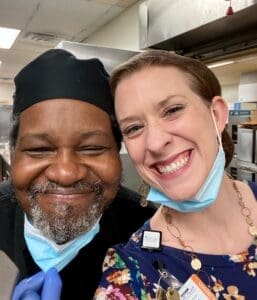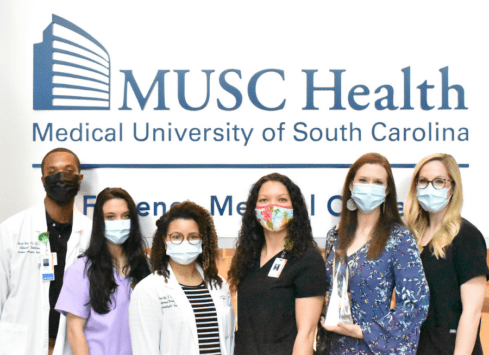Caroline Thompson Says It Best: Better Nutrition Means Better Medical Care
Caroline Thompson wakes up most days looking for an opportunity to about how better nutrition can help patients recover faster.
“I love being the advocate for nutrition,” she says. “I love attending meetings with the medical team where I can take the science of nutrition and translate it into practical solutions for our patients. It’s incredibly satisfying.”

As Morrison Healthcare’s Director of Nutrition Systems at the Medical University of South Carolina’s (MUSC) Florence and Marion campuses, Caroline is using her knowledge of nutrition to bring innovative solutions to patient care. As we celebrate Registered Dietitian Nutritionist (RDN) Day on March 10th, Caroline’s work shows how RDNs make a difference in patient’s lives every day.
After 11 years as a registered dietitian, including four years with Morrison Healthcare, she shares her enthusiasm for nutrition with her clinical team of dietitians. Here are a handful of recent examples of how she and her team emphasize nutrition as an essential part of medical care:
Enhanced Recovery After Surgery (ERAS)
Traditionally, patients undergoing surgery do not eat the day before and up to several days after surgery. “Patients need ample nutrition to help them recover from surgery”, Caroline says. “The goal in implementing ERAS is to nutritionally prepare the patient’s body for the stress of surgery and then provide extra nutrition after surgery to help the body recover.”
After working closely with the nursing department, Caroline developed a comprehensive nutrition plan that the medical team endorsed. Patients on the ERAS protocol now drink a carbohydrate supplement (Ensure Pre-Surgery) the night before and two hours before surgery to help prevent insulin resistance and post-operative hyperglycemia, which can lead to infection. Patients also receive three supplement drinks (Ensure Surgery) five days before and five days following surgery to give the body the nutritional boost it needs for healing. Following surgery, the patient receives one meal of clear liquids. If the liquids are tolerated well, the diet is then advanced to regular food.
Feeding Patients During Dialysis
Hospitalized patients receiving dialysis often miss up to six meals each week, as eating while receiving dialysis has been historically discouraged due to potential effects on the blood pressure. Unfortunately, this practice places the patient at high risk for malnutrition.
Changes happened after Caroline submitted research to the medical team showing that optimum nutrition is essential in this patient population and that patients may be fed during dialysis sessions while still keeping blood pressure under control. Patients are now able to take their meal trays with them or have their meal delivered to their dialysis session. Blood pressure is checked frequently to make sure the patient is stable. “This was one of my most satisfying accomplishments,” she says. “It often seems impossible to change ‘what has always been done’, but we have finally been able to move beyond this with the dialysis patients.”
Implementing the Nutrition Focused Physical Exam (NFPE)
Until a few years ago dietitians were accustomed to minimal physical contact with patients. “With the development of ASPEN guidelines on diagnosing malnutrition and dietetic interns expecting to be educated on them, the clinical team received education and began practicing the NFPE on all initial assessments,” Caroline recalls.
She says Morrison provides excellent training and resources to help the team through this transition. “A patient of any weight, any age can be malnourished. Performing the NFPE is now an integral part of helping our dietitians identify malnutrition,” Caroline says.
Working Closely with Kitchen Staff

Caroline understands that a clinical approach alone may not help a patient if meals made in the kitchen aren’t accurate. “The kitchen is where the rubber meets the road for nutrition,” she says. “The food provide to the patients has to meet certain nutrient requirements, depending on the medical needs of the patient.” To that end, Caroline has reviewed each item on the MUSC patient menu to make certain each meal is delivering the right amount of nutrients – down to the last butter packet.
In the end, the goal is clear. Caroline knows she and her clinical team can make a world of difference to the thousands of patients who come into the hospital every year, and this change starts when she and the clinical dietitians advocate for updated, evidence-based nutrition practices whenever they can. “ The clinical dietitians on my team do an amazing job attending patient rounds and communicating with the interdisciplinary team. They make themselves visible and available to the medical staff for nutrition-based questions and advice. They are well known to the interdisciplinary team and command respect for their nutrition expertise. I often reflect on how honored I am to lead such talented RDs.”




